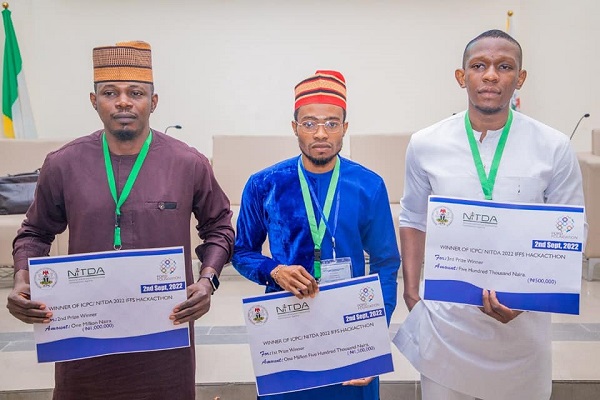
Three innovators – E-procure, IFFMER, and E-xpose – have emerged winners of the Illicit Financial Flows (IFFs) Hackathon organised by the Independent Corrupt Practices and Related Offences Commission (ICPC) with technical support from the National Information Technology Development Agency (NITDA).
The innovators who emerged first, second third, respectively, were among seven shortlisted innovators that pitched their ideas for the IFFs Hackathon Demo Day organised by the duo in conjunction with the Ford Foundation, clinched the cash prize of N1.5 million, N1 million and N500,000, in that order.
The hackathon, themed “Innovative Technology Ideas to Curb Corruption and Illicit Financial Flows in Government Budgets and MDAs Procurement Process in Nigeria” took place at the ICPC auditorium. Its aim, organisers said, was to develop indigenous solutions to curb illicit financial flows (IFFs) in ministries departments and agencies (MDAs) and check for indigenous movement of funds within Nigeria and across international borders to ensure the effective monitoring procurement processes.
The seven startups that pitched at the hackathon used the School Feeding Programme (SFP) as a case study.
Giving his remarks, the NITDA director-general, Mallam Kashifu Abdullahi said the hackathon is captured under three pillars of the agency’s seven Strategic Roadmap and Action Plan (SRAP 2021-2024) which includes the promotion of indigenous content, digital innovation and emerging technologies.
“We believe that we have to actually promote our content and have homegrown solutions here in Nigeria. When we import technology, only the technology is transferred and not the knowledge.”
Represented by NITDA’s director, standards, guidelines and frameworks, Mr. Oladejo Olawunmi, Abdullahi opined that it is not ideal to fight corruption with imported technology as there is “always a back end”.
Abdullahi said the NITDA takes it upon itself to ensure that innovations or ideas pitched at any hackathon it is involved in are incubated, so that young innovators are mentored and given the needed exposure within and outside the country to attract investors.
“NITDA has taken startups to international exhibitions and has won prizes at the Gulf Information Technology Exhibition (GITEX).”
He added that emerging technologies like artificial intelligence, blockchain, big data and many more are new technologies that will be useful in curbing corruption.
Earlier in his opening remarks, the ICPC chairman, Prof. Bolaji Owasanoye, SAN, appreciated NITDA for its technical support in making the hackathon successful, stating that: “the School Feeding Funds’ investigation and experience has led us to today’s activities support by Ford Foundation.
“IFFs remain a major avenue for diversion of revenue both in the local and transnational transactions and activities and the deliverables from this event is to have negotiation guidelines that we hope will be adopted by the government, and those who have businesses to do with the government will have a template to guide them on how to act for the government.”
Giving a brief of the IFFs hackathon selection process, the team lead from NITDA, Dr. Zareefa Mustapha said there was a call for application, with over 2400 applications sent in. She said hubs were engaged as consultants for the screening processes, as they know what is happening in the technology space and are in the best position to identify viable solutions.
“In the first stage of the selection process it was screened down to 50 and, from, that it was screened down to 22.
“The 22 were interviewed and they did a demo of their technologies. That was how the top seven were selected,” she added.
Mustapha explained that the selected seven innovators were judged based on six criteria adaptability, originality, practicability, sustainability, accessibility and technicality.
She said there was a booth camp for the selected seven at the agency’s subsidiary, the National Centre for Artificial Intelligence and Robotics (NCAIR) and there were technical partners to guide them through.
The regional director, Ford Foundation, West Africa, Dr. Chichi Aniagolu-Okoye commended the innovators for intellectually tasking themselves to come up with their various innovations.
“Your technology may end up not being what the ICPC needs but it may be something that the Ford Foundation can take to the next level.”
The other innovations at the demo day were DBlaze App, Blockchain Solution, CAVAS and FoodySchool.


